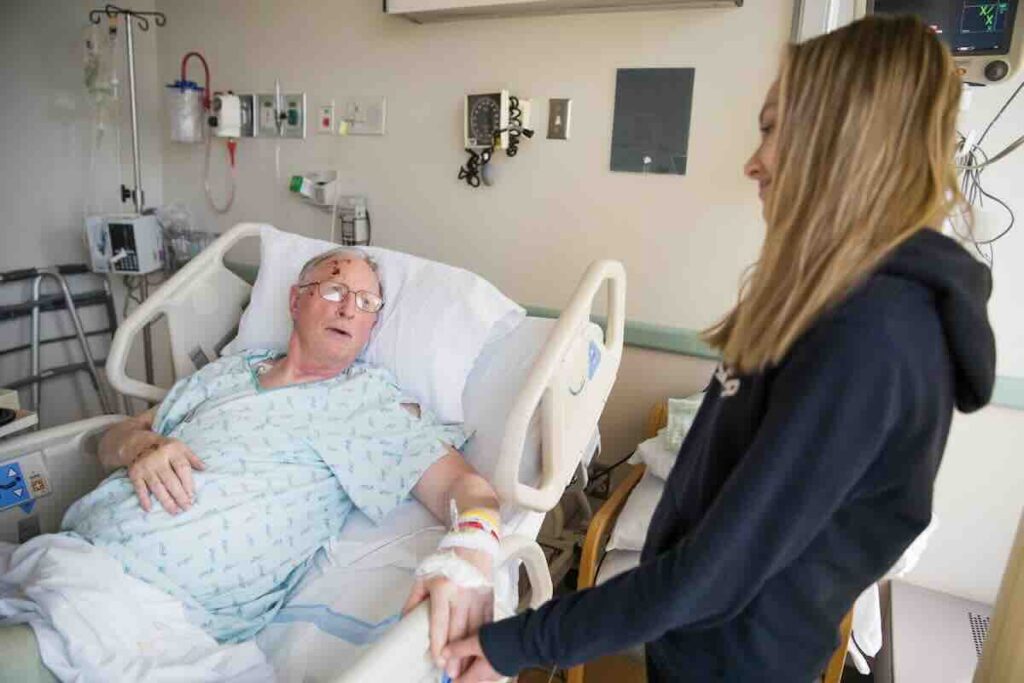When a loved one is facing a life-limiting illness, it can be overwhelming. Families often feel alone and unsure how to navigate the challenges ahead. That’s why it’s so important to have support. Depending on a patient’s needs, a hospice team includes a registered nurse, home health aides, a medical social worker, a spiritual care coordinator, and volunteers. In this article, we’d like to share more about the important role of a hospice volunteer and how they offer support during this challenging time.
What’s the Role of a Hospice Volunteer?

Hospice volunteers are much more than helpers — they’re vital members of a supportive care team. Volunteers are there for logistical help, emotional relief and companionship, and a kind presence. Some volunteers work in the office or at special events. Others create cards, blankets, and other comforting items to be delivered to patients. And some volunteers work directly with patients and families. When a volunteer works with a patient, they offer:
- Emotional Relief: Volunteers offer a comforting, listening ear, making patients feel valued and understood.
- Personal Connection: They spend time engaging in conversation and provide support for patients and families.
- Joyful Engagement: Through activities like storytelling or art, volunteers help create moments of fun, joy, and peace.
Beyond Medical Support: Practical Assistance and Legacy Building

While professional care is vital, hospice volunteers provide non-medical support to enrich patients’ lives and lighten the load for caregivers. Their involvement bridges the gap between medical providers and patients. Volunteers help maintain a sense of normalcy and dignity to make the most of every moment. Here are some of the ways volunteers may spend time with patients and families:
- Assisting With (Non-Medical) Daily Tasks: A hospice volunteer can help with light housekeeping, meal preparation, or simply sitting quietly with patients. Volunteers never provide medical care.
- Running Errands: Volunteers can help by being “go-fers,” picking up items, or running various errands to help the family.
- Facilitating Spiritual Conversations: If a patient wishes, volunteers may have spiritual discussions that support personal beliefs and cultural traditions.
- Aiding in Legacy Projects: Whether it’s compiling stories, photographs, or family recipes, a hospice volunteer can help complete legacy projects that celebrate a patient’s life story.
- Bereavement Support: After a loved one passes, volunteers are available for conversations and support.
A Diverse Community of Compassion

Hospice volunteers come from a variety of walks of life. Each volunteer is different and offers unique skills and perspectives. Here at Envision Hospice, we’re truly blessed to have amazing volunteers with various talents and professional certifications. From aromatherapy experts and hairdressers to musicians and artists, our volunteers complement the work of our medical team with their unique talents and personalities through holistic support.
Every hospice volunteer goes through a thorough background check, interview, and training in our hospice philosophy. We emphasize the importance of patient privacy and safety, and we clarify specific responsibilities for non-medical team members. In essence, they’re there to provide meaningful support while honoring the dignity of each patient and family. Volunteers may have backgrounds as:
- Retired professionals
- College students
- Stay-at-home parents
- Veterans
This rich tapestry of experience can ease caregiver stress, connect with patients and families, and help celebrate a patient’s life.

Impacting Lives Through Meaningful Connections
The influence of a hospice volunteer goes far beyond assisting with daily, non-medical tasks. A volunteer can also:
- Ease Caregiver Stress: By stepping in to provide respite care, volunteers allow family caregivers to take necessary breaks and recharge.
- Supporting Dignity: The presence of a hospice volunteer can help make patients’ final days full of dignity and heartfelt care.
- Making Memories: Through various activities — friendly chats, reading a book together, sharing a hobby, or engaging in creative projects — a hospice volunteer helps create memories with patients and their families.
Making the Most of Each Moment
At Envision Hospice, we understand that facing a life-limiting illness brings complex emotions and difficult decisions. However, we want to make the most of every moment, uphold a patient’s dignity, and honor their legacy. Hospice volunteers play an important role in making this possible by providing emotional comfort, assisting with non-medical tasks, and helping patients know they’re seen, heard, and loved.
Remember, you are not alone on this journey. We are here for support. If you have questions or need further guidance, please reach out to us at Envision Hospice.

FAQ About Hospice Volunteers
Below are some frequently asked questions (FAQ) that families might have about hospice volunteers:
1. What exactly is a hospice volunteer, and what do they do?
Hospice volunteers are compassionate individuals who support patients and their families by offering companionship, emotional relief, and non-medical assistance. They help create a caring environment through activities like engaging in meaningful conversations, assisting with light tasks, and even helping with legacy projects to celebrate the life of your loved one.
2. How are hospice volunteers trained and prepared?
Hospice volunteers receive specialized training that covers:
- Compassionate communication and active listening skills
- Cultural and spiritual sensitivity
- Confidentiality and boundary-setting guidelines
- Basic techniques to support patients during emotionally challenging times
This preparation ensures that volunteers can effectively contribute to a respectful, supportive care environment.
3. What types of support do hospice volunteers provide to families?
Hospice volunteers are there to support families with non-medical assistance. Some of the things they can help with include:
- Running errands
- Reading books with patients
- Offering a listening ear and emotional comfort
- Assisting with everyday tasks and light household duties
- Providing respite care to give family caregivers a chance to rest
- Helping with non-medical activities that promote comfort and joy, such as shared hobbies or memory projects
Their involvement can help reduce caregiver stress and enrich the patient’s daily experience.
4. What if my loved one isn’t comfortable interacting with a volunteer?
It’s important to remember that every individual’s needs and preferences are unique. If your loved one prefers not to engage with a hospice volunteer right away, the hospice team will work closely with your family to adjust the care plan. If a particular volunteer doesn’t mesh with a patient or family, a different volunteer can visit. A hospice volunteer’s role is to support and accommodate your loved one’s comfort levels, and it’s important that interactions are meaningful and respectful.
5. How do I become a hospice volunteer?
We greatly value our volunteer team members. If you’re interested in becoming a volunteer at Envision Hospice, please contact our office or fill out a Volunteer Application Form.

